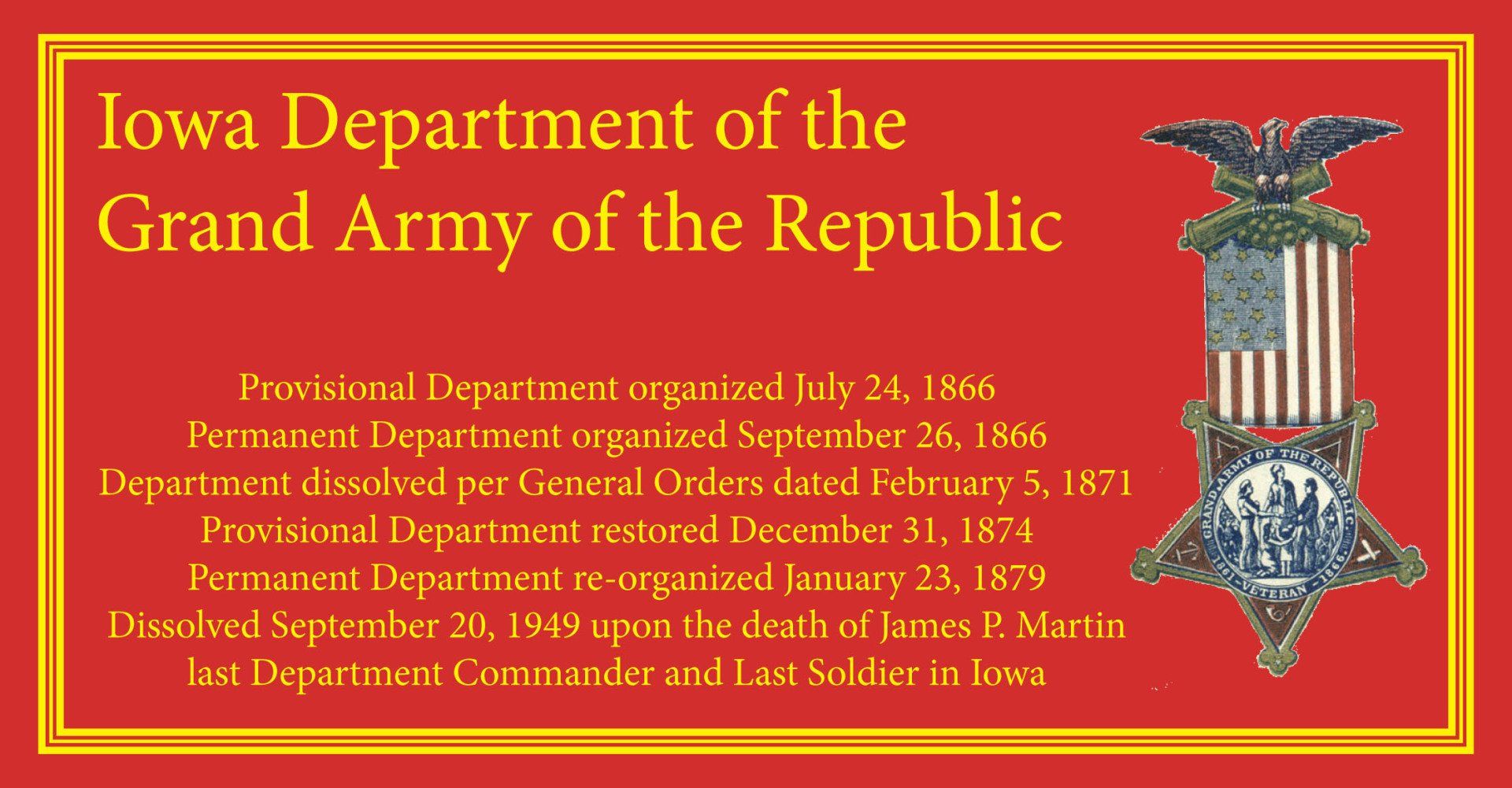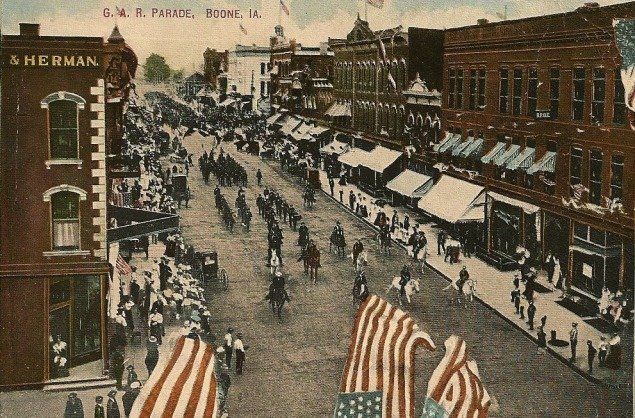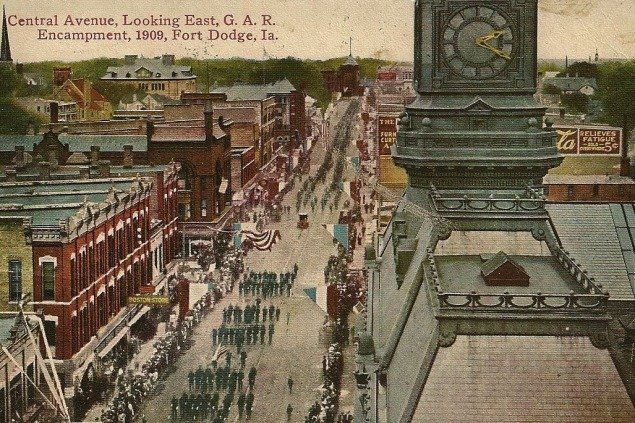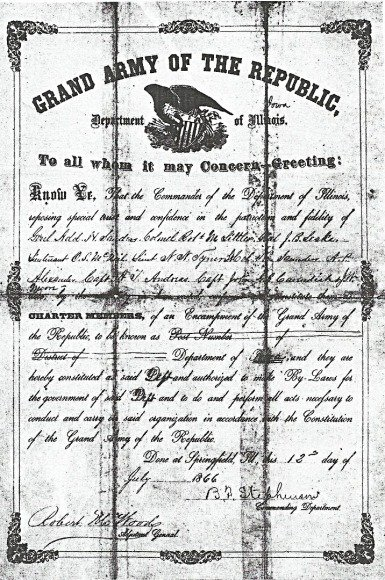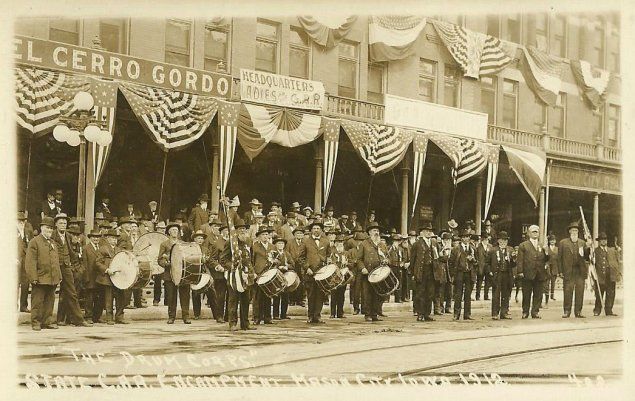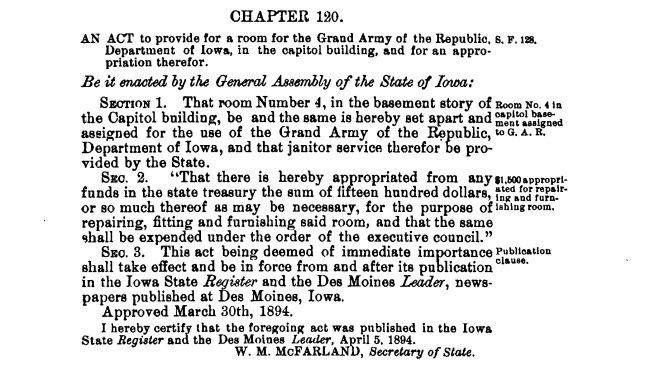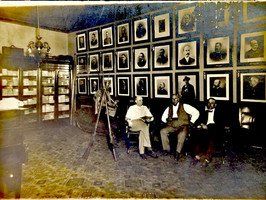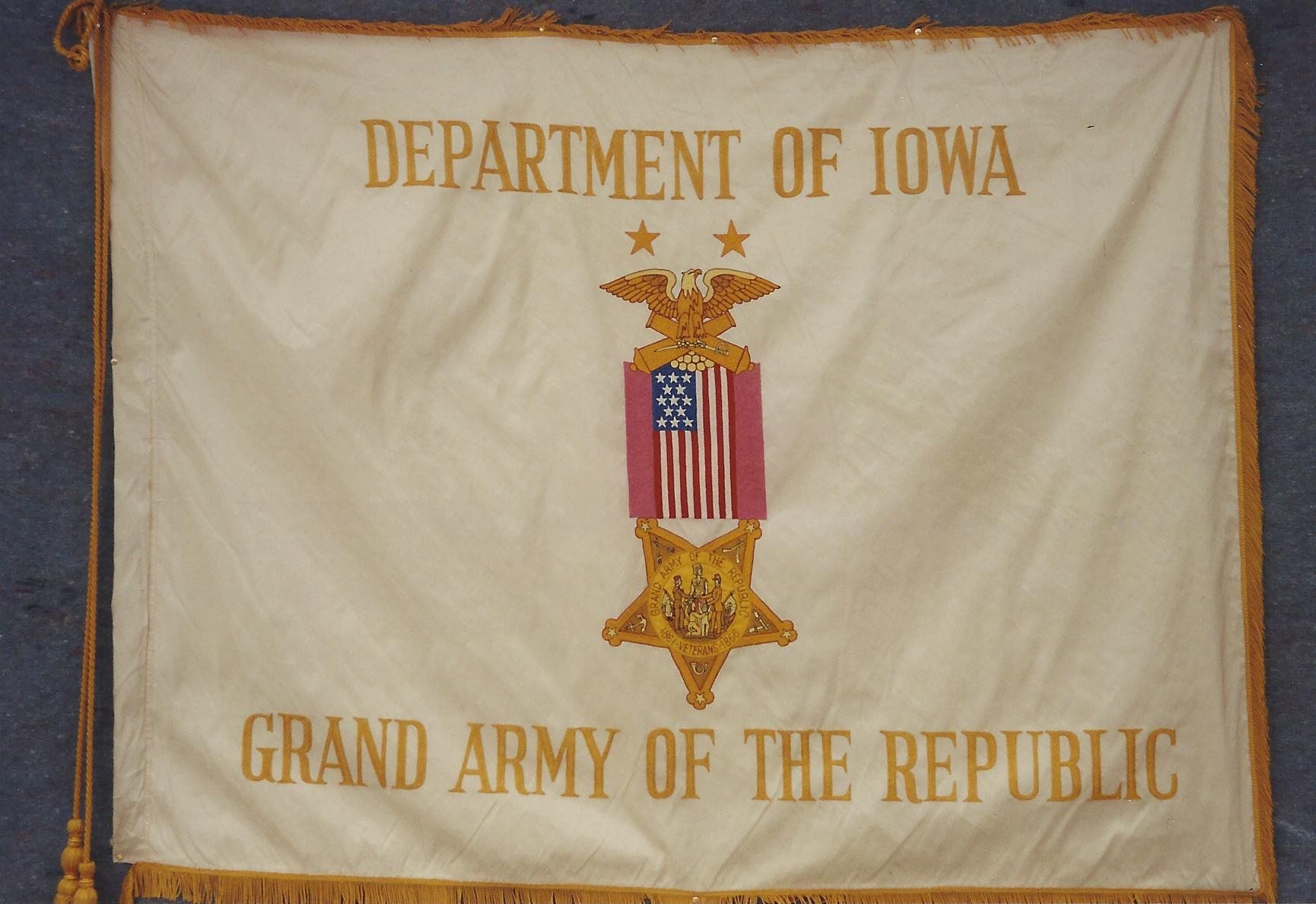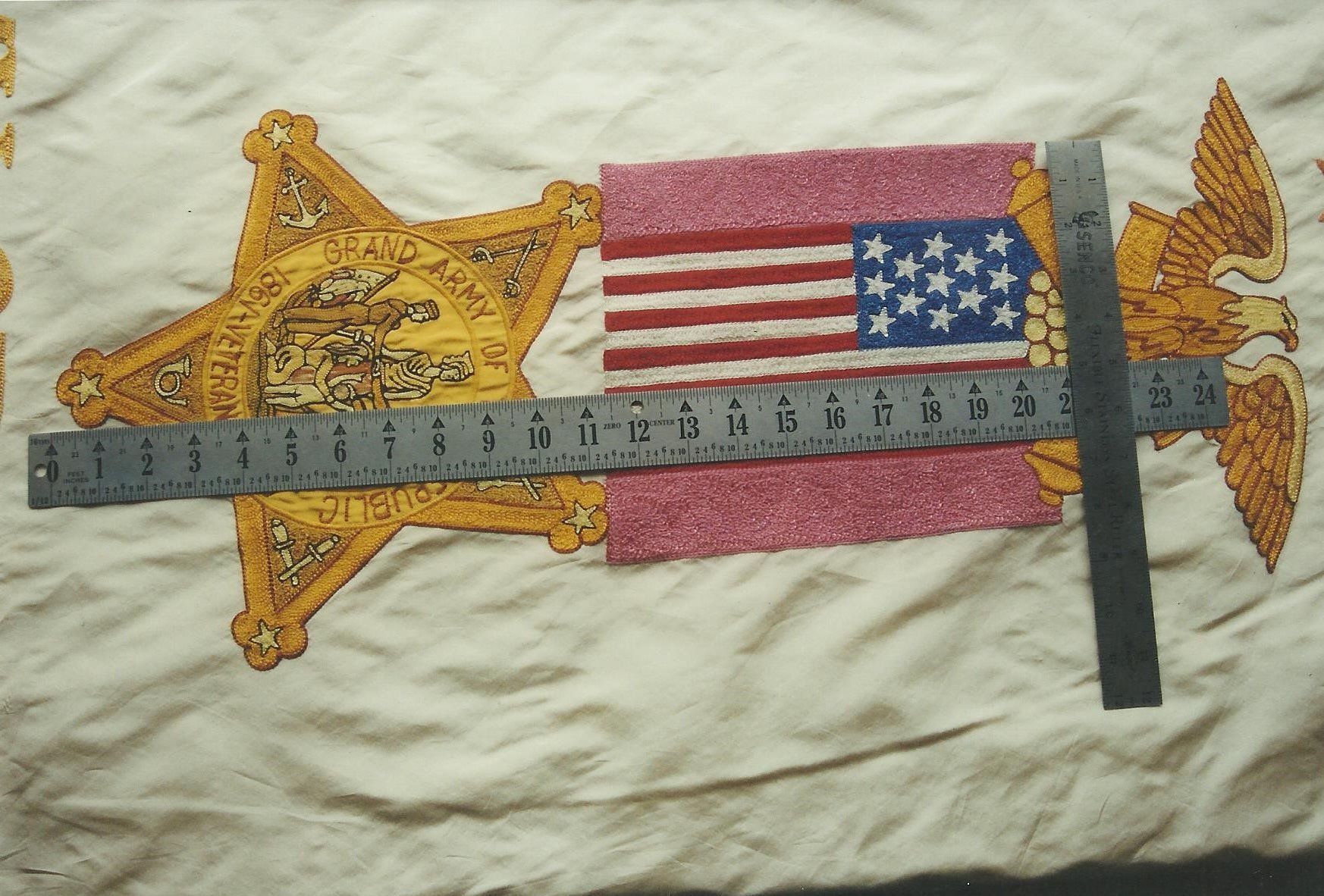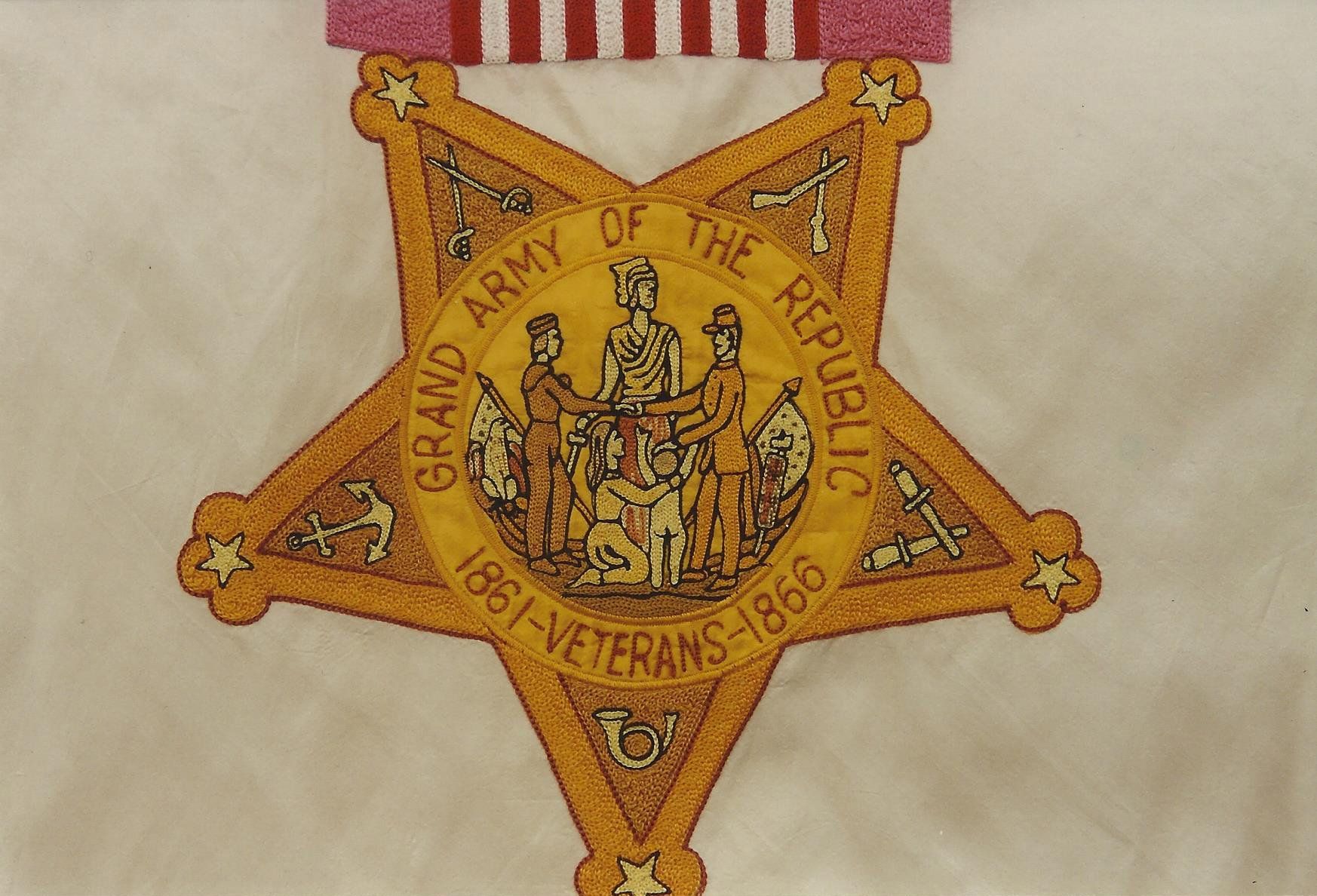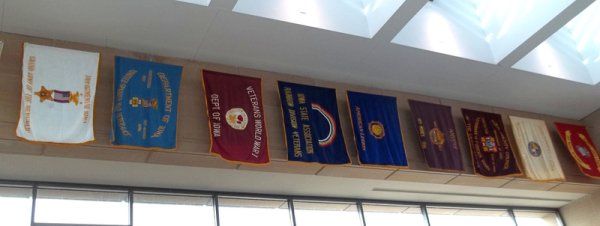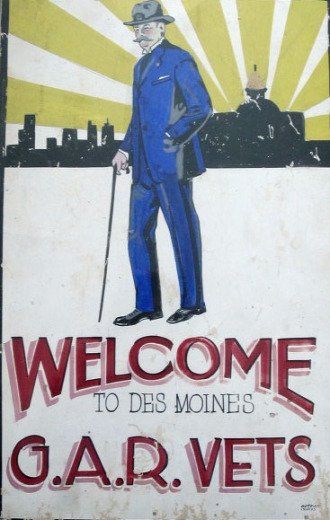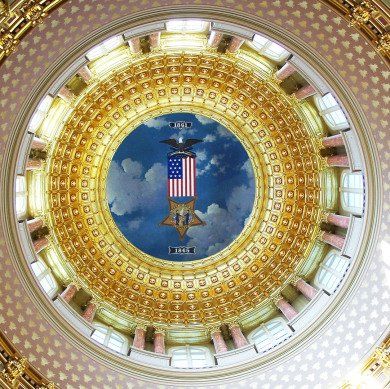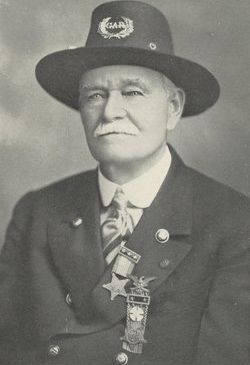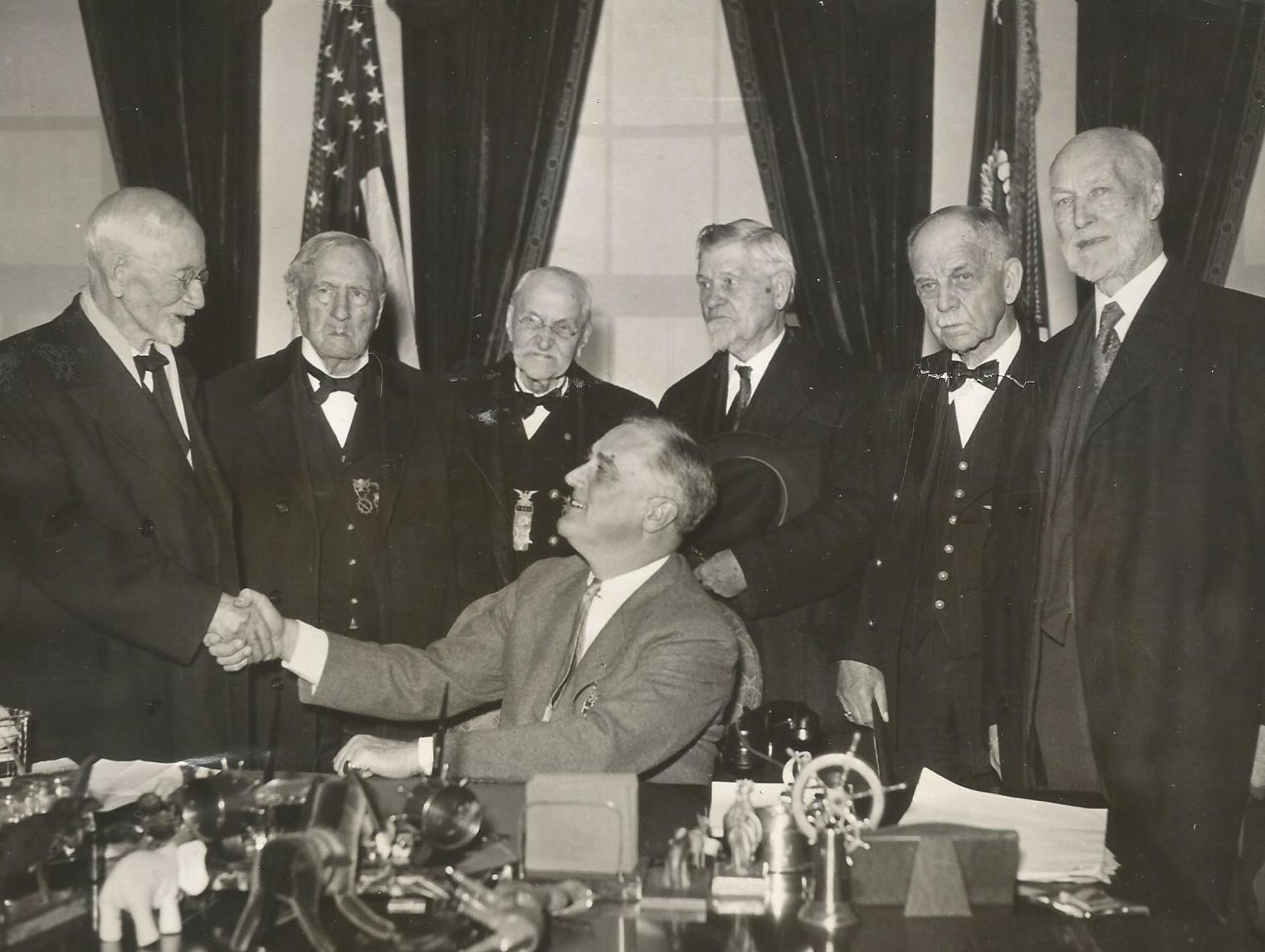* Find-a-Grave ** died in office
Davenport Fall 1865
“Old Soldiers’ Association of Scott County”
Addison H. Sanders
*
Charter Issued to Department of Iowa July 12, 1866
Provisional Department of Iowa Organized July 24, 1866
Davenport July 24, 1866
“Old Soldiers’ Association of Scott County” became
Post No. 1, Department of Iowa, G.A.R.
Addison H. Sanders
- Provisional Commander
Department of Iowa Established September 26, 1866
Davenport - September 26, 1866
Joseph B. Leake
*- Commander
Sep 1866 – Apr 1867
Davenport - April 10, 1867
William T. Shaw
*
- Commander
Apr 1867 – Jan 1868
Davenport - January 8, 1868
James A. Williamson
* - Commander
Jan 1868 – Aug 1869
Davenport - August 4, 1869
Elliott W. Rice
*
- Commander
Aug 1869 - Feb 5, 1871
Department of Iowa February 5, 1871
Iowa City - February 1872
John N. Coldren
* - Provisional Commander
Feb 1872 – Feb 1874
February 1874
James C. Parrott
* - Provisional Commander
Feb 1874 – Jan 1875
Posts: 3 Membership: 62
Provisional Department of Iowa Restored December 31, 1874
1st Encampment - Keokuk - January 31, 1875
James C. Parrott - Provisional Commander
Jan 1875 – Jan 1876
Posts: 2 Membership: 92
2nd Encampment - Keokuk - January 12, 1876
Joseph C. Stone
*
- Provisional Commander
Jan 1876-resigned Sep 1876
Albert A. Perkins - Provisional Commander
Sep 1876 – Jan 1877
Posts: 1 Membership: 75
3rd
Encampment -
Burlington - January 12, 1877
Albert A. Perkins
*
- Provisional Commander
Jan 1877 – Jan 1878
Posts: 2 Membership: 61
4th
Encampment -
Burlington - January 19, 1878
Albert A. Perkins
- Provisional Commander
Jan 1878 – Jan 1879
Posts: 6 Membership: 119
Department of Iowa Re-Organized January 23, 1879
5th
Encampment -
Des Moines - January 23, 1879
Hurlbut E. Griswold
*
- Commander
Jan 1879 – Feb 1880
Posts: 13 Membership: 435
6th
Encampment -
Des Moines - February 4, 1880
William F. Conrad
*
- Commander
Feb 1880 – Jan 1881
Posts: 12 Membership: 540
7th
Encampment -
Des Moines - January 27, 1881
Peter V. Carey
*
- Commander
Jan 1881 – Feb 1882
Posts: 34 Membership: 1,549
8th
Encampment -
Des Moines - February 23, 1882
George B. Hogan
*
- Commander
Feb 1882 – Apr 1883
Posts: 91 Membership: 3,818
9th
Encampment -
Des Moines - April 4, 1883
John B. Cooke
*
- Commander
Apr 1883 – Apr 1884
Posts: 237 Membership: 11,001
10th
Encampment -
Marshalltown - April 23, 1884
Edward G. Miller
*
- Commander
Apr 1884 – Apr 1885
Posts: 300 Membership: 16,506
11th
Encampment -
Davenport - April 22, 1885
William G. Manning
*
- Commander
Apr 1885 – Apr 1886
Posts: 414 Membership: 17,371
12th
Encampment -
Sioux City - April 7, 1886
William A. McHenry
*
- Commander
Apr 1886 – Apr 1887
Posts: 391 Membership: 16,861
13th
Encampment -
Dubuque - April 20-21, 1887
James M. Tuttle
*
- Commander
Apr 1887 – Apr 1888
Posts: 395 Membership: 17,646
14th
Encampment -
Cedar Rapids - April 11-12, 1888
Eugene A. Consigny
*
- Commander
Apr 1888 – Apr 1889
Posts: 401 Membership: 18,384
15th
Encampment -
Burlington - April 10-11, 1889
Charles H. Smith
*
- Commander
Apr 1889 – Apr 1890
Posts: 424 Membership: 20,236
16th
Encampment -
Des Moines - April 8-9, 1890
Mason P. Mills
*
- Commander
Apr 1890 – Apr 1891
Posts: 435 Membership: 20, 324
17th
Encampment -
Dubuque - April 15-16, 1891
Charles L. Davidson
*
- Commander
Apr 1891 – May 1892
Posts: 439 Membership: 19,904
18th
Encampment -
Ottumwa - May 11-12, 1892
John J. Steadman
*
- Commander
May 1892 – Apr 1893
Posts: 447 Membership: 19,078
19th
Encampment -
Keokuk - April 26-27, 1893
Philip Schaller
*
- Commander
Apr 1893 – Jun 1894
Posts: 427 Membership: 17,658
20th
Encampment -
Council Bluffs - June 1894
George A. Newman
*
- Commander
Jun
1894 – May 1895
Posts: 439 Membership: 18,061
21st
Encampment -
Clinton - May 7-9, 1895
James K. P. Thompson
*
- Commander
May 1895 – Apr 1896
Posts: 437 Membership: 16,386
22nd
Encampment -
Cedar Rapids - April 28-30, 1896
Josiah Given
*
- Commander
Apr 1896 – Jun 1897
Posts: 434 Membership: 15,561
23rd
Encampment -
Marshalltown - June 1897
Amos H. Evans
*
- Commander
Jun 1897 – Jun 1898
Posts: 434 Membership: 15,059
24th
Encampment -
Sioux City - June 15-16, 1898
Rodney W. Tirrill
*
- Commander
Jun 1898 – Jun 1899
Posts: 437 Membership: 15,171
25th
Encampment -
Waterloo - June 14-15, 1899
Charles F. Bailey
*
- Commander
Jun 1899 - Jun 1900
Posts: 434 Membership: 14,718
26th
Encampment -
Davenport - June 12-14, 1900
Madison B. Davis
*
- Commander
Jun 1900 - Jun 1901
Posts: 393 Membership: 12,952
27th
Encampment -
Dubuque - June 1901
George Metzger
*
- Commander
Jun 1901 - May 1902
Posts: 384 Membership: 12,653
28th
Encampment -
Des Moines - May 21-23, 1902
John Lindt
*
- Commander
May 1902 - May 1903
Posts: 383 Membership: 12,579
29th
Encampment -
Cedar Rapids - May 19-21, 1903
Levi B. Raymond
*
- Commander
May 1903 - Jun 1904
Posts: 372 Membership: 12,208
30th
Encampment -
Mason City - June 7-9, 1904
Robert T. St. John
*
- Commander
Jun 1904 - May 1905
Posts: 368 Membership: 11,728
31st
Encampment -
Oskaloosa - May 16-18, 1905
Samuel H. Harper
*
- Commander
May 1905 - Jun 1906
Posts: 356 Membership: 11,412
32nd
Encampment -
Boone - June 5-7, 1906
Charles A. Clark*
M.O.H
.
- Commander
Jun 1906 - Jun 1907
Posts: 356 Membership: 11,221
33rd
Encampment -
Dubuque - June 11-14, 1907
David J. Palmer
*
CinC
- Commander
Jun 1907 - Jun 1908
Posts: 346 Membership: 10,984
34th
Encampment -
Cedar Rapids - June 9-12, 1908
James C. Milliman
*
- Commander
Jun 1908 - Jun 1909
Posts: 342 Membership: 10,729
35th
Encampment -
Ft. Dodge - June 8-10, 1909
Michael McDonald
*
- Commander
Jun 1909 - Jun 1910
Posts: 344 Membership: 10,775
36th
Encampment -
Des Moines - June 8-10, 1910
Henry A. Dyer
*
- Commander
Jun 1910 - Jun 1911
Posts: 328 Membership: 8,514
37th
Encampment -
Muscatine - June 13-15, 1911
Lot Abraham
*
- Commander
Jun 1911 - Jun 1912
Posts: 337 Membership: 9,286
38th
Encampment -
Mason City - June 11-13, 1912
John D. Brown
*
Commander
Jun 1912 - Jun 1913
Posts: 330 Membership: 9,067
39th
Encampment -
Des Moines - June 1913
James W. Willett
*
CinC
- Commander
Jun 1913 - Jun 1914
Posts: 328 Membership: 8514
40th
Encampment -
Burlington - June 16-19, 1914
Byron C. Ward
*
- Commander
Jun 1914 - Jun 1915
Posts: 322 Membership: 8,207
41st
Encampment -
Sioux City - June 8-10, 1915
John F. Merry
*
- Commander
Jun 1915 - Jun 1916
Posts: 311 Membership: 7,903
42nd
Encampment -
Marshalltown - June 20-22, 1916
John H. Mills
*
- Commander
Jun 1916 - Jun 1917
Posts: 303 Membership: 7,120
43rd
Encampment -
Davenport - June 19-21, 1917
James L. Farrington
*
- Commander
Jun 1917 - Jun 1918
Posts: 288 Membership: 6,513
44th
Encampment -
Des Moines - June 10-12, 1918
Elmer J. C. Bealer
*
- Commander
Jun 1918 -1919
Posts: 281 Membership: 6,201
45th
Encampment -
Cedar Rapids - June 1919
Alexander G. Beatty
*
- Commander
Jun 1919 - Jun 1920
Posts: 265 Membership: 5,977
46th
Encampment -
Ottumwa - June 1920
Rufus L. Chase
*
- Commander
Jun 1920 - Jun 1921
Posts: 254 Membership: 4,930
47th
Encampment -
Waterloo - June 7-9, 1921
James B. Harsh
*
- Commander
Jun 1921 - Jun 1922
Posts: 236 Membership: 4,433
48th
Encampment -
Iowa City - June 1922
Leonard J. Kron
*
- Commander
Jun 1922 - Jun 1923
Posts: 220 Membership: 3,994
49th
Encampment -
Ft. Dodge - June 5-7, 1923
William W. Gist
*
**
- Commander
Jun 6, 1923 - Jun 8, 1923
Wilbert S. Freeman* - Commander
Jun 8, 1923 - Jun 1924
Posts: 220 Membership: 3,539
50th
Encampment -
Marshalltown - June 10-12, 1924
William H. Needham
*
**
- Commander
Jun 1924 - Oct 15, 1924
Posts: 220 Membership: 3,450
Daniel B. Cowles
* **
- Commander
Oct 15, 1924 - May 14, 1925
Orlando S. Hartman
*
- Commander
May 14, 1925 - Jun 1925
51st
Encampment -
Mason City - June 1925
Frank Dagle
*
- Commander
Jun 1925 - Jun 1926
Posts: 200 Membership: 2,954
52nd
Encampment -
Keokuk - June 8–10, 1926
Eliphalet J. Stonebraker
*
- Commander
Jun 1926 - Jun 1927
Posts: 202 Membership: 2,631
53rd
Encampment -
Newton - June 21-23, 1927
Oley Nelson
*
CinC
- Commander
Jun 1927 – Jun 1928
Posts: 188 Membership 2,168
54th
Encampment -
Cedar Rapids - June 5-7, 1928
John W. Stratton
*
- Commander
Jun 1928 - Jun 1929
Posts: 167 Membership: 1,770
55th
Encampment -
Ft. Dodge - June 11-13, 1929
John K. Ewing
*
**
- Commander
Jun 1929 - Apr 30, 1930
Posts: 142 Membership: 1,389
Joseph Pratt
*
- Commander
Apr 30, 1930 - Jun 1930
56th
Encampment -
Ottumwa - June 10-12, 1930
Watson S. Risden
*
- Commander
Jun 1930 - Jun 1931
Posts: 114 Membership: 1,102
57th
Encampment -
Marshalltown - June 8-11, 1931
John T. Lucas
*
- Commander
Jun 1931 - Jun 1932
Posts: 107 Membership: 884
58th
Encampment -
Council Bluffs - June 6-9, 1932
Thomas J. Noll
*
-
Commander
Jun 1932 - Jun 1933
Posts: 69 Membership: 652
59th
Encampment -
Ft. Madison June 12-15, 1933
Frank L. Quade
*
- Commander
Jun 1933 - Jun 1934
Posts: 71 Membership: 492
60th
Encampment -
Des Moines - June 11-13, 1934
Louis J. Leech
*
- Commander
Jun 1934 - Jun 1935
Posts: 70 Membership: 402
61st
Encampment -
Waterloo - June 9-12, 1935
Horace B. Kelly
*
**
- Commander
Jun 1935 - Aug 2, 1935
Posts: 49 Membership: 271
Jonathan C. Hanes
*
- Commander
Aug 2, 1935 - Jun 1936
62nd
Encampment -
Des Moines - June 7-11, 1936
John P. Risley
*
- Commander
Jun 1936 - Jun 1937
Posts: 28 Membership: 179
63rd
Encampment -
Davenport - June 20-24, 1937
John P. Risley **
- Commander
Jun 1937 - Mar 27, 1938
Posts: 18 Membership: 129
Michael J. Hawk
- Commander
Mar 27, 1938 - Jun 1938
64th
Encampment -
Sioux City - June 5-8, 1938
Michael J. Hawk
*
- Commander
Jun 1938 - Jun 1939
Posts: 16 Membership: 73
65th
Encampment -
Iowa City - Jun 18-21, 1939
James W. Willett
*
**
- Commander
1939 - May 13, 1940
Posts: 10 Membership: 67
Jacob J. Neuman
- Commander
May 13, 1940 - Jun 1940
66th
Encampment -
Des Moines - June 9-12, 1940
Jacob J. Neuman
*
Commander
Jun 1940 - Jun 1941
Posts: 10 Membership: 110
67th
Encampment -
Des Moines - June 8-11, 1941
Elliott P. Taylor
*
- Commander
Jun 1941 - Jun 1942
Posts: 4 Membership: 71
68th
Encampment -
Des Moines - June 7-10, 1942
John M. Gudgel
*
Commander
Jun 1942 - Jun 1943
Posts: 2 Membership: 47
69th
Encampment -
Davenport - June 6–9, 1943
Thomas J. Noll
*
**
- Commander
Jun 1943 - Aug 31, 1943
Posts: 2 Membership: 28
David B. Sisk
*
- Commander
Sep 1, 1943- Jun 1944
70th
Encampment -
Ft. Dodge - June 4-7, 1944
John M. Gudgel
- Commander
Jun 1944 - Jun 1945
Posts: 1 Membership: 17
71st
Encampment -
Des Moines - June 7-8, 1945
John M. Gudgel
- Commander
Jun 1945 - Jun 1946
Posts: 0 Membership: 13
72nd
Encampment -
Cedar Rapids - June 7-10, 1946
John M. Gudgel **
- Commander
Jun 1946 - Mar 22, 1947
Posts: 0 Membership: 5
James P. Martin
- Commander
Apr 3, 1947 – Jun 1947
73rd
Encampment -
Des Moines - June 15-17, 1947
James P. Martin
*
- Commander
Jun 1947 - Jun 1948
Posts: 0 Membership: 3
74th
Encampment -
Mason City - June 7-10, 1948
James P. Martin
- Commander
Jun 1948 - Jun 1949
Posts: 0 Membership: 2
75th
Encampment -
Cedar Rapids - June 5-8, 1949
James P. Martin **
- Commander
Jun 1949 - Sep 20, 1949
Posts: 0 Membership: 1
Commander Martin was ill and unable to attend, Department Secretary
Amy Noll
*
presided.
James P. Martin Last Commander
Last Member of the Department of Iowa
Last Civil War Veteran in the State of Iowa
